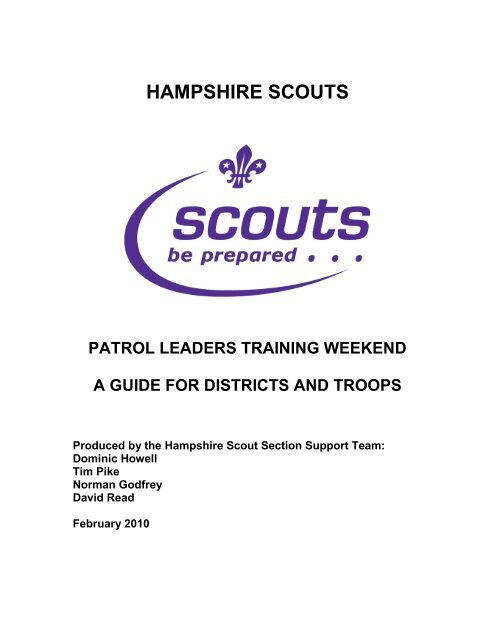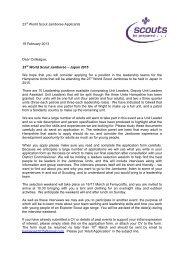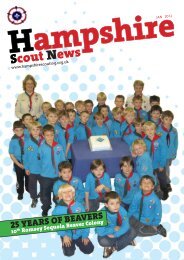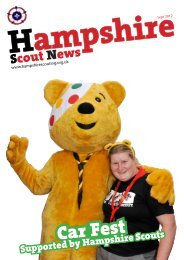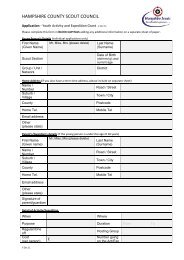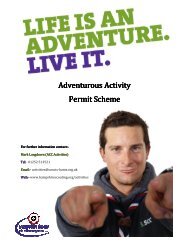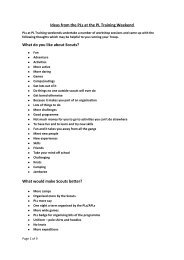hampshire scouts patrol leaders training weekend a guide for ...
hampshire scouts patrol leaders training weekend a guide for ...
hampshire scouts patrol leaders training weekend a guide for ...
Create successful ePaper yourself
Turn your PDF publications into a flip-book with our unique Google optimized e-Paper software.
Finally, the activity leader should ask the Scouts <strong>for</strong> the featuresOf good teams (<strong>for</strong> example successful sports teams they know).Here are the ideas suggested at one of our <strong>weekend</strong>s:CommunicationCo-ordinationListen to each otherThe right attitudeRespect <strong>for</strong> each otherTeam identityPerseveranceHave a good manager / coachCo-operationCompromiseHave a strategyMotivationOrganisationDisciplineFriendship11.00am Activity: something energetic to burn off some energy –preferably in the groups to rein<strong>for</strong>ce team working. For example,completing an orienteering course, remembering the skills learntduring the first session.11.45amLeadership – the objective of this session is <strong>for</strong> the Scouts tounderstand the features of a good leader, and different styles of<strong>leaders</strong>hip.The groups should be asked to identify the behaviours of a goodleader – thinking about the good <strong>leaders</strong> they know.Here are the ideas suggested at one of our <strong>weekend</strong>s:Positive outlookApproachableConfidence / beliefSense of humourVersatilePraisingKnow what’s going onLearn from mistakesEmpathySet a good exampleCommitmentAble to explainPractice what you preachFairnessAuthority / controlRespect and respected12.10pmActivity: Putting <strong>leaders</strong>hip behaviour and teamwork into practiceDepending on what activities are available at the location you areusing, find two or three activities that use teamwork and <strong>leaders</strong>hipskills. For example:• Moving a pole around an adventure course• Using barrels and planks to move across a (imaginary) river
1.00pm2.00pmLunchCommunication – the objective of this session is <strong>for</strong> the Scouts tounderstand how best to communicate clearly to their Patrolmembers.Activity: Providing clear instructionsbricks),Provide each group with a very simple Lego model (10 to 15and a duplicate set of bricks loose in a bag. One member of thegroup should describe the model, and the rest of the team shouldtry to replicate the model from the verbal instructions provided. Thedescriber and the group should not be able to get each others’constructions. The activity can be repeated to give each member ofthe group a turn at describing.The groups should then be asked to think about what to rememberwhen communicating with their Patrol members. For example:Listen to each otherBe precise and accurate withinstructionsAdapt what you say if they don’tunderstandBe patientBe clearRepeat yourself if necessaryUse eye contactUse the right amount of detailThe activity leader should then ask the groups to identify whatthey have learnt during the session.Activity: Putting communications skills to the testTwo activities should be selected that require the groups to put theircommunications skills to the test. For example:- The groups are given 15 minutes to prepare an advertisement <strong>for</strong>joining Scouts, that takes approximately one minute to per<strong>for</strong>m.This will require then to appoint a leader <strong>for</strong> the task, and use their<strong>leaders</strong>hip and team-working skills to complete the activity in time.The advertisement is then per<strong>for</strong>med in front of the other groups,and they can provide feedback in the <strong>for</strong>m of scores.- The groups complete a shepherding game, requiring them todevise a method of gathering all but one of the Patrol members in a
pen whilst they are blindfolded. Only the non-blindfolded Scout canissue instructions as to which direction and how far to move. Thegroups can be scored on how quickly they complete the activity.3.30pm3.50pmCom<strong>for</strong>t breakChallenging Behaviour – the objective of this session is <strong>for</strong> theScouts to understand why challenging behaviour takes place intheir Troops, and what can be done to address it.The activity leader should ask the groups to identify whatchallenging behaviour happens in their Troops, and what steps theLeaders and Patrol Leaders use to address it.Activity: The groups should be asked to devise a Code of ConductThat they think would work within their Troops. This should bePresented on a piece of flipchart paper.Here are some of the ideas suggested at one of our <strong>weekend</strong>s:Obey instructionsDon’t retaliateRespect propertyListen to your Patrol LeaderFollow the Code of Conduct!Have funTurn up on timeRespect others ideasLeave electrical gadgets at homeThink be<strong>for</strong>e you doMake sure everyone is involvedBe yourself!Respect othersIgnore attention seekersObey the <strong>leaders</strong>Try your hardest at everythingUni<strong>for</strong>m must be smartDon’t use mobile phonesMind your languageFollow the Scout LawsSilence at flag breakTwo warnings, then actionRespect your environmentDo what you’re asked first time4.50pmGames - the objective of this session is <strong>for</strong> the Scouts tounderstand how games can be used <strong>for</strong> different purposes andtry some new games.The activity leader introduces the session by describing thereasons that different games may be used during a Scoutmeeting. For example, to use up energy, rein<strong>for</strong>ce a skill,time to reflect, etc.The activity leader then runs a number of games with differentpurposes. Play a variety of quick games, and try variations andadapting the rules etc. In addition to livening up the session, thisprovides the material to facilitate the discussion and learning on
games.Suggestions <strong>for</strong> games that can be used:o Quiet: Stand <strong>for</strong> a minute – Variation: Play in teams?o Quiet / Skill: Kim’s gameo Energetic: NSEW – Variations add Bow, Stern, Port, Starboard withbow being North and then change the boat direction.o Energetic / Team: Relay Race, - Variations: This has plenty ofvariations. Run, Hop, Hop backwards, In sack, Crawl in Crabposition. Link hands under legs and reverse the order withoutletting go etc.o Skill / Team: Relay race tying a knotsFinally, the groups consider what games are most successfulat their Troop meetings, and the reasons <strong>for</strong> using them.6.00pm7.00pm8.00pm10.00pmBreakDinnerEvening entertainment – depending on the location and weather.e.g. camp fire, wide game, film screening.Supper
Sunday8.00am9.00amBreakfastProgramme Planning - the objective of this session is <strong>for</strong> theScouts to understand how the Scout programme is constructed,and get new ideas <strong>for</strong> their Troop meetings.Activity: Each Group is asked to generate ideas that they haveused <strong>for</strong> their Troop meetings from one Programme Zone andwrite them on a sheet of flip chart paper. The sheets arerotated between the groups every 5 minutes until every grouphave contributed ideas to every sheet.Here are some of the ideas generated <strong>for</strong> the Programme Zonesduring one of our <strong>weekend</strong>s:Scoutcraft and adventure:ArcheryCamp gadgetsKnotsAxe and sawFirst aidTreasure huntBack to basicsCyclingCampsWater activitiesHigh and low ropesRifle shootingSurvival campIce skatingClimbing and abseilingClay pigeon shootingMap and compass workCampfireWide gamesShelter buildingOrienteeringHikesCavingPioneeringFirelightingAerial runwayDragon boatingGliding and flyingLaser questRope swings
Creative expression:CookingCollageGraffiti artWoggle makingSoap carvingMusical groupsTextilesPrintingJokesMagic tricksPuppet showsFace paintingPanto / gangshowCandle makingActingArts and craftsCampfire sketchesMaking AirfixWoodworkKite makingPostersCircus skillsChristmas cardsGlass paintingCommunity:Visit local fire stationFundraising <strong>for</strong> community projectBagpackingVolunteeringCommunity serviceGardeningScout postRemembrance Day paradeLocal historyLitter pickingGang ShowHelping Beavers and CubsHelping old people across the roadVisit local servicesGlobal:Jamboree on the Air / InternetScout camps abroadTheme night on another countryMap bingoForeign food eveningFinding out about Scouts in othercountriesScout exchangePenpalsRecyclingShoe box appealGlobal eventsBadge swapping
Fit <strong>for</strong> Life:Outdoor gamesCyclingIndoor gamesAssault CourseIce skatingKayakingRugbyFootballHealthy eatingDragon boatingFree runningCookingGymHikingClimbingTrampoliningDrug awarenessSwimmingKarateRunningRaftingRowingHockeySailingMartial artsPersonal hygieneExploring beliefs and attitudes:Prayers and reflectionsScout Law and promiseHelping new ScoutsWorld issuesJamboreesDebatesGoing on paradeScouts ownExploring religionsSeeing other culturesVisits to religious placesHelping other peopleEach Group is then asked to plan an eight week (half term)programme of activities, that is balanced between the ProgrammeZones. If time allows, the group can explain their programme to theother groups in plenary.10.00amActivity planning - the objective of this session is <strong>for</strong> theScouts to understand how to construct an evening programme,and what issues should be considered.The activity leader introduces the session by asking the Scoutsto discuss what needs to be thought about when choosing anactivity to run during a Scout meeting.Here are the ideas suggested at one of our <strong>weekend</strong>s:What instructions are needed?Are there any safety issues?Where will it take place?Do we need to tell anyone be<strong>for</strong>ehand?Who is taking part?How long will be take?What do we want to achieve?What preparation is required?
Equipment required:Labels <strong>for</strong> name badgesPens / pencilsBingo sheets (see Annex 1)NewspaperElastic bandsSellotapeTape measureLego bricksBlindfoldsFlipchart paperEquipment <strong>for</strong> practical activities selected
Annex 1Holds the ChiefScout’s Silver AwardIs wearing black socks Plays the guitarHas been to a wintercampHas a brother and asisterWears glassesHas traveled by trainthis weekPlays football Was a Beaver Scout Can recite the ScoutLawsLikes marmiteOldest child in thefamilyFirst name starts witha vowelWas born inDecemberHas a petTraveled abroadduring 2009Has more than 5Activity badgesWent to summer campin 2009Has traveled morethan 10 miles to gethereHas blue eyes
Annex 2What is the Hazard?How could you reducethe impact of the hazard?How could you reduce thechance of an incident?


